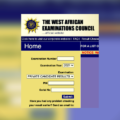1. Begin reading right away.
Regardless of whether you are in SS1, 2, or 3, Start preparing for your WAEC now if you haven’t already.
This is why.
WAEC covers a wide range of topics in each subject, and the fact that you’ll be sitting for (9) WAEC subjects is a compelling reason to begin studying for the exam as soon as possible.
The sooner you begin reading, the more topics you will cover.
And the more topics you cover in each subject, the higher your grade in that subject will be.
2. Read in accordance with the syllabus
It is beneficial to cover more topics in each subject, but it would be even better if you covered more “WAEC recommended” topics for your exam.
This is due to the fact that the WAEC questions for each of your subjects will be drawn from the topics covered in the syllabus for that subject.
As a result, you do not need to read all of the topics from SS1–3.
Instead.
Only read the topics recommended in the WAEC syllabus for your subjects.
Other topics are a waste of time because they will not be discussed.
3. Read with the recommended textbooks
Along with the recommended topics, WAEC also suggest textbooks with good explanations on those topics as well.
Take note.
These textbooks are not compulsory to have but they are recommended.
And you only need to have just one (or two) of the WAEC recommended textbooks for your subjects, and not all of them.
4. Study past questions
For an Exam Council that has been setting questions on the same subjects since 1952 till date…
Don’t you also think that by now they must have run out of new questions to ask?
The truth is that.
Over 70 percent of the next WAEC questions have been asked in previous WAEC.
Which means that for every 50 objective questions, 35 have been asked before. And for every 10 theory or practical questions, 7 are repetitions.
But how can you predict the past questions that will be repeated in WAEC this year?
We found that the most repeated questions in WAEC are often within 10 years interval.
So here’s what you do…
Get WAEC past questions.
Pick five random years from 1988-1998
Another five from 1998-2008
One last five from 2008-2018
Study these 15 different years of WAEC past questions and you’d even begin to see the repeated questions yourself and also understand their pattern.
The more WAEC past questions you study, the more likely you’d see repeated questions in your WAEC.
And the more repeated questions you see in your WAEC, the higher you will score because they will be questions you have practiced before.
5. Make core subjects a priority.
“Core subjects” are those subjects that are required for your class or course.
To “prioritize” something means to make it more important than others.
Prioritizing core subjects entails devoting more time to reading your mandatory subjects.
As an example,
The most important subjects for all WAEC candidates are English and Mathematics.
This means that you must prioritize your reading of English and Mathematics because failing either of them will render your WAEC result useless — regardless of how well you did in other subjects.
6. Don’t bother with Expo.
You will likely get some WAEC expo from your school or teachers but it is not smart to depend totally on it.
Here’s one reason why.
What will you do when an incorruptible invigilator comes on the day of your core subject and refuses to take any bribe?
To be on the safe side, expect expo but prepare like there won’t be any.
Read enough to do AT LEAST 60 percent of that WAEC subject paper on your own — which will get you a B (or at least C) that you can proudly defend.
7. Start with questions you know
Limited time is always allocated to each of your WAEC subject paper.
So you’d need to be fast in answering all the required questions and the best way to do that is to start with the questions you know.
You will surely encounter some tough questions — but what’s the point of wasting time on a question you don’t know when there are many other questions that you know but are yet to be answered?
If you just started the paper (which means that there is still time), skip those tough questions and return to them after you have finished with all the questions that you know.
But remember to return to those tough questions when you are done with others.





